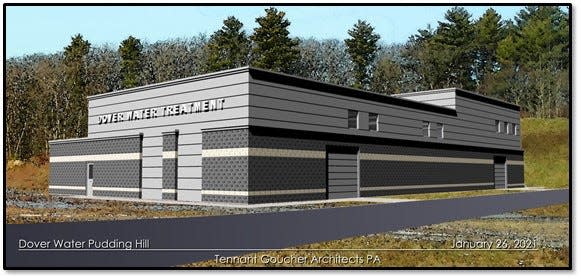'1 million gallons a day': Dover OKs $13.9M water plant amid talks with PFAS polluter
DOVER — A $13.9 million water treatment facility with the capability to treat PFAS contaminants has been approved by the City Council. Meanwhile Dover leaders continue to negotiate how much of the cost will be paid by the metal recycling company responsible for polluting the aquifer.
The Pudding Hill facility will treat water from the city's Griffen, Ireland and DPH-1 wells, all of which draw from the Pudding Hill aquifer. All three wells have been taken offline in recent years due to precautions related to perfluoroalkyl and polyfluoroalkyl substances, known as PFAS or "forever chemicals," which have been traced to a former auto recycling facility, according to city officials.
"I feel like this is a legacy project," said John Storer, director of Community Services for the city. "As a water operator, it's very comforting to get this project under construction and know we'll have safe water into the future."

The City Council voted Wednesday night to approve a contract with Penta Corporation of Moultonboro to construct the Pudding Hill Water Treatment Facility for $13,927,910.
'We don't want more people to die': Dover council OKs full-time shelter
"The Pudding Hill aquifer is a major water supply for Dover," City Manager Michael Joyal told the City Council. "We decided to go ahead because we have had water shortages and we need this. We will bring a settlement agreement to the council at a future date on their contribution toward the cost of the treatment facility."
The plant will use a proven carbon absorption filtration system. Storer believes the system can bring PFAS down to non-detect levels, as a carbon filtration system has done at Portsmouth's Pease water treatment facility.
Auto recycler will help pay for Dover plant, but how much?
New England Metal Recycling Inc. in 2020 was fined $2.7 million, the largest penalty in New Hampshire history, for improper disposal of hazardous waste, causing the contamination of the Pudding Hill aquifer in Dover.
The New Hampshire attorney general's office, in announcing the fine last year, stated the company, under former leadership, took steps to hide the material at its 290 Knox Marsh Road facility in Madbury years ago, after it had been ordered to remove it.
Photo gallery: Veterans Day 2021 in Dover
The company has been working on removing what is known as “auto shredder residue,” also called “ASR” or “fluff.”
Storer said the company's process of removing the material from an "unlined, unlicensed landfill" is expected to go into 2022.
Storer said Dover's negotiations with New England Metal Recycling Inc., a subsidiary of Schnitzer Steel Industries Inc., is focused on how much of the cost of the water plant and its operation is the responsibility of the company. He acknowledged there are certain costs Dover would ordinarily cover operating the water plant that are the responsibility of the city. The company will be expected to pay for costs associated with building and operating the plant, he said.
"I think negotiations are in the final stages," he said, adding he hopes the sides will come to a recommended funding agreement to present to the City Council in the "next month or two."
Previous coverage: Madbury company to pay historic $2.7 million fine for polluting Dover water supply
New England Metal Recycling began operating the facility in 1998, authorities stated in 2020 when the company was fined. The groundwater contamination was found and ordered fixed by the New Hampshire Department of Environmental Services in 2006. Storer said no contaminated water was delivered to Dover residents, citing water monitoring processes.
Dover's water supply will get a big boost with new plant
Dover's population is 32,741, according to the 2020 Census, an increase of 9.2% since the 2010 Census. People in the city have been concerned the population growth could strain the water supply, Storer said. He said water demand has been stable despite population growth.
However, regaining access to the Pudding Hill aquifer wells again when the new plant is up and running will help avoid problems like last summer, when Dover was one of many municipalities to implement water use restrictions amid a drought.
"We've been deprived of 1.1 million gallons of water a day so reopening the aquifer will really secure the future," he said.
Pudding Hill aquifer: 'Critical' for Dover's water needs
He said the Pudding Hill aquifer "has historically been the proverbial 'workhorse' of the city’s public water supply," providing about 45% of the city's water going back to the mid-1990s.
"Today, the city averages about 2 million gallons per day of water production over the course of a year," Storer wrote in an email. "The Pudding Hill aquifer alone can produce more than 1 million gallons per day. ... The new treatment plant will ensure Dover has sufficient water supply sources to meet expected demands well into the foreseeable future."
This article originally appeared on Fosters Daily Democrat: Dover NH approves $13.9M water plant amid talks with PFAS polluter
